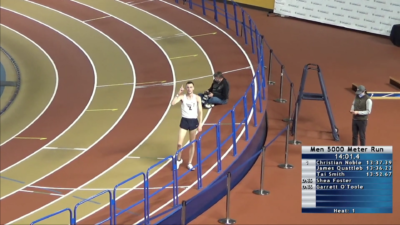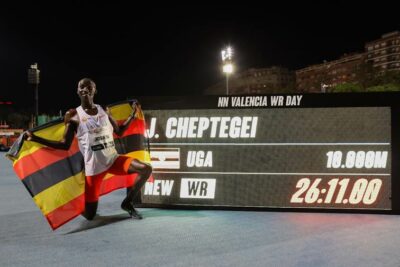NCAA May Not Accept Christian Noble’s 13:37 Division II 5K Record Due to Pacing Lights
By Jonathan Gault
January 29, 2021
On Sunday night, Christian Noble of Lee (Tenn.) University ran the fastest indoor time ever by a Division II 5,000-meter runner. Noble’s 13:37.39 at the Magic City Elite meet in Birmingham, Ala., was an 11-second personal best and almost four seconds faster than the previous DII best of 13:41.08, run by Abilene Christian’s Nicodemus Naimadu 16 years ago. It was a stellar performance, run mostly alone — Noble led every step of the final 15 laps after pacemaker Garrett O’Toole stepped off the track after two kilometers.
And it may not count.
On Monday afternoon, Dave Milner, the meet director of Magic City Elite, was forwarded an email by an NCAA official, inquiring about “Illegal Assistance by the use of pacing lights.” Milner said the official told him the case will go before a committee to determine whether the NCAA will recognize the mark. Noble easily surpassed the automatic qualifying mark for the NCAA Indoor Championships (14:03.43), but if the NCAA fails to recognize his performance on Sunday, he would have to run another race in order to qualify — at a time when indoor competitions are in short supply.
“Christian’s coach Caleb Morgan called me [on Thursday] and told me, I’ve heard through the grapevine that they’re not going to allow the mark,” Milner says.
The NCAA does not maintain official collegiate records. The USTFCCCA, which does keep track of records, currently lists Noble as the Division II record holder, but that may change, depending on the NCAA’s findings.
“Our aim with records and marks that originate in-season is to follow the competition rulings the collegiate governing body has upheld,” USTFCCCA director of media, broadcasting, and analytics Tom Lewis wrote in an email to LetsRun.com.
The facts
The Magic City Elite meet utilized Light Speed Pacing — a system similar to the Wavelight technology that helped Joshua Cheptegei break world records at 5,000 and 10,000 meters last year in Monaco and Valencia (Milner also used Light Speed at the Five & Dime Athletics Meeting in December, in which Jenna Hutchins set a girls’ high school 5,000 record of 15:34.47). Light Speed uses 16 lights, which are evenly-spaced on the infield just inside lane 1 and programmed to light up to indicate a specified pace.
Ahead of the meet, Milner asked his chief official to check the NCAA and USATF rulebooks to ensure the Light Speed system was okay. They couldn’t find anything that suggested the lights were illegal.
All five races at Magic City (two high school races and three open races) utilized Light Speed; Noble and Wingate University’s Tai Smith, also entered in the men’s 5,000, were the only collegiate athletes entered in the meet. In the men’s 5,000, Milner instructed David Hudman, the operator of Light Speed Pacing, to set the pace at 13:40 — a time that both Noble and post-collegiate athlete James Quattlebaum were targeting. Noble ran 13:37; Quattlebaum wound up fading and finishing second in 14:07. Smith, the only other finisher, ran 14:24 — 47 seconds behind Noble. An NCAA official declined to say whether Smith’s time, currently #4 in Division II, is in jeopardy as well.
What the rulebook says
Electronic lights such as Light Speed are specifically allowed under both USATF and World Athletics rules, but under NCAA rules, they are prohibited.
Here is what NCAA Track & Field Rule 6, Section 4, Article 1a.4) (see page 57 here, emphasis added):
For the purpose of this rule, the following shall be considered assistance, and therefore not allowed: Pacing in races by persons not participating in the same race, by lapped competitors or those about to be lapped, by competitors of the opposite gender in the same race, or pacesetting by any kind of technical device that benefits the field.
But the NCAA’s 2020-21 championship qualifying criteria states that “qualifying marks must be made in a scheduled collegiate or open track and field meet conducted under the NCAA Rules of Competition or an open track and field competition conducted under the competition rules of the NCAA, USATF or IAAF.” The Magic City Elite meet was an open competition conducted under USATF rules (the meet was USATF-sanctioned) — and again, pacing lights are explicitly legal under USATF rules.
After realizing this, we immediately wondered why is this even being investigated. The NCAA rulebook says athletes can be disqualified only “on the report of an official, or from a properly filed protest.” So who filed the report or protest?
Mark Kostek, the secretary rules editor for NCAA men’s & women’s track & field/cross country, declined to disclose the identity of the individual who filed the report, stating only, “an outside source provided video evidence of the pacing lights being utilized.”
We asked Kostek who at NCAA would make the final call about whether Noble’s mark will stand and he replied in writing, “This answer is not within my purview. I only interpret if a violation occurred…After viewing the race it was clear that the athlete(s) did receive the benefit of pacesetting by the utilization of a technical device which by rules is not allowed.”
That doesn’t mean that the mark is definitely not allowed. Noble’s coach, Caleb Morgan, submitted an appeal to the NCAA on Thursday.
What a joke – pacing lights should be encouraged during a pandemic
Let’s bring some common sense into the equation. The pacing lights did not change the outcome of the race. For the NCAA to prevent the top distance runner in Division II from competing at the national championships because there were pacing lights in a three-person race — which he won by 30+ seconds — at a tiny meet in January is utterly nonsensical in any year, but particularly this one, when we are in the midst of a global pandemic. Pacing lights can actually make a race safer from a COVID-19 perspective as compared to having a real human pacer (though the Magic City meet featured both). Plus the NCAA qualifying criteria says you can qualify at open meets run under USATF rules, as was the case here.
The whole situation is farcical, a perfect storm of an out-of-date rule and an unknown third party trying to rain on one of the brightest moments of the 2021 indoor season.
Last year, after Wavelight technology started to become widespread, World Athletics and USATF updated their rulebooks to make clear pacing lights were legal. The NCAA, whether out of stubbornness or indifference, did not follow their lead and update its own rules.
So now we have a situation where a collegiate athlete can be paced by a professional runner — who, unlike a pacing light, can break the wind — but not by a set of lights. If pacing lights can be used to set a world record, why can’t they be used to set an NCAA record as well?
“The thing that bothers me most about this is that, big picture, this kind of technology makes a track meet more engaging for the fan as much as it helps the athlete,” said Milner.
There are a few silver linings. Even if Noble’s mark does not count for NCAA qualifying purposes, he is already qualified for NCAAs in the mile (he is the DII leader at 4:00.60) and will go for a qualifier in the 3,000 this weekend. And since the meet was USATF-sanctioned and the race followed USATF rules, Noble can still use it to qualify for this summer’s US Olympic Trials — if he makes the cut (the auto standard is 13:25.00).
Which means that, regardless of what any NCAA committee determines, 13:37.39 is Christian Noble’s official personal best. In the eyes of USATF. In the eyes of World Athletics. And in the eyes of anyone with common sense.
Talk about this on our messageboard. MB: In midst of global pandemic, NCAA may not allow Christian Noble’s 13:37 DII record as it was aided by pacing lights








